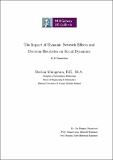The Impact of Dynamic Network Effects and Decision Heuristics on Social Dynamics

View/
Date
2011-08-31Author
Mungovan, Declan
Metadata
Show full item recordUsage
This item's downloads: 461 (view details)
Abstract
Many systems in the real world display properties that cannot be easily understood
by an analysis of their component parts. There are a number of approaches used
to help us gain insight into these complex systems. One of the advantages of using
Agent Based Modelling (ABM) over System Dynamics (SD) is that they are capable
of creating disaggregated populations of heterogenous agents. This approach allows
network effects to be modelled which have been shown to play an important role in
the diffusion of information through populations. This dissertation explores dynamic network effects and decision heuristics on social dynamics in simulated populations of artificial agents. First, an exploration of the effect that dynamic random interactions have on the emergence and evolution of social norms is presented. An agent's norm is influenced by both their own fixed social network plus a second random network composed of a subset of the remaining population. A weighted selection algorithm is developed that uses an individual's path distance on the network to determine their chance of meeting a stranger. Two separate decision heuristics are then contrasted: one where agents make highest utility based rational decisions and another that uses a markov decision process. The effect that these random interactions have on the evolution of a more complex social norm as it propagates throughout the population is then discussed. The simulations show that random social interactions play an important role in norm convergence when the choice is between two completing alternatives, and is less important when the norm is mutable and prone to change.
Next, the dynamic process moves to the level of the agents' social network. Most
network models are based on static structures that don't change, or are grown one node
at a time. This dissertation develops a bottom-up generative model whereby agents on
the network autonomously decide whether to create new links or break existing ones.
This is achieved by each agent sending out introductory signals to their acquaintances.
Different agent based decision heuristics are then explored. This approach allows for
the creation of agent based distributed dynamic networks that display small world
properties.
Finally, the dynamic network formation model developed is applied to different kinds
of social dynamics. First, the effect of norm diffusion and evolution is analyzed in a simulated growing population of agents. Real world demographic data is used which
replicates the exponential growth found in human systems. This results in multiple
social norms existing in the population as norms are passed down from parents to
offspring. The second kind of social dynamic investigated is concerned with the dissemination of value neutral cultural variants. The neutral model has previously been
shown to capture the effect of a power law distribution of variants. This dissertation
builds on the neutral model and shows that it is resilient at producing the observed
power law distribution when constrained on both the dynamic nature of the population
and the social network they inhabit.
A network component was designed for use in the iSim+ simulation software developed
in the university. This consists of numerous different network types, processes and
associated metrics used for calculating network properties. This framework was then
used to addresses the different aspects of social dynamics mentioned above.

